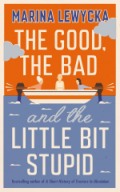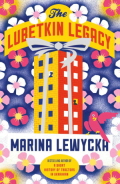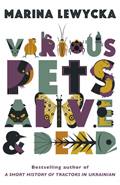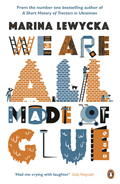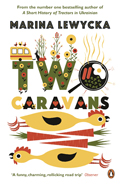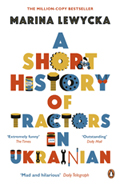And Finally ...
Fairholmes to Lockerbrook and Derwent walk
The mild autumn/winter weather got me out on some splendid Peak District walks. A new one for me, though I have done all its components separately before, was from Fairholmes on the Derwent Reservoir, up to Lockerbrook heights and back via Fagney Clough.
You park on the roadside before Fairholmes at Derwent Dam and take a footpath straight up Hagg Side towards Lockerbrook Farm. I have fond memories of the Lockerbrook centre, from the days when my daughter was in the Woodcraft folk and we spent many cold and muddy weekends up there building dens and cooking beans on toast. In the olden days we would walk over to Alport Castles, a strange and bleak rock formation off the Snake Road, but you don’t have to go all that way. Turn right along a stony lane at the top and it will bring you gently down into the valley, with lovely views of the Derwent reservoir and Howden Moor as you walk down. We stopped for a freezing wind-whipped lunch on the shores of the reservoir, then back to Derwent Dam at Fairholmes, where the water thundering down was a frightening fore-warning of the floods that would soon be unleashed in Yorkshire and Cumbria.
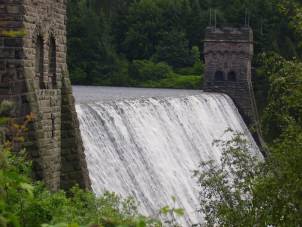
Then back to Sheffield for a nice cup of tea. Bliss.
Stanage Edge and Hathersage: a walk with the Financial Times
This lovely walk takes in the gritstone edge at Stanage, North Lees Hall which is thought to be the setting of Mr Rochester's House in Charlotte Bronte's Jane Eyre and a tea or pub stop in Hathersage.
![]()
I've been letting off steam in the Independent again. I wrote this in a fury when I thought we were about to bomb Syria.
THANKS TO all of you who've written to me via my long-suffering agent Bill. One of these days I'll get a link set up on this website, but I'm afraid I'd then I'd spend all my time writing letters and never get another book written. Thank you especially to Becky Gottsegen who sent me a picture of herself with her wonderful, sad, almost-human sculptures of the human condition.
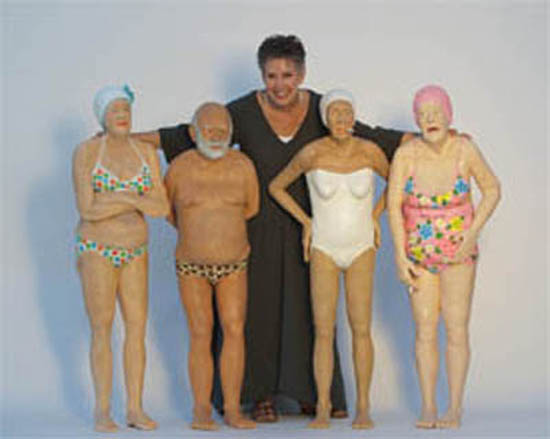
I was fascinated by this article in the Guardian, which revisits the area of Kiev where I walked with Victoria and Sophia in October 2011 (see below) and was appalled by the ugliness of the plutocrat mansions springing up. I even took a photo. It's sad to see Ukraine becoming another country where money rules and other values are squeezed out.

HANDY HINT Listening to Radio 4 extra at night is my amazing drug-free cure for years of insomnia. I listen via earbuds, and fall asleep within 10 mins. If I wake in the night, I just go back to the last bit I can remember, and start again. It changed my life - but I hope you won't sleep through too much of Various Pets Alive and Dead, or keep your partner awake by unseemly giggling.
![]()
Walking in Kiev with Sophia and Victoria October 2011
We started our walk in the Podil district, which still has steep cobbled streets, lots of old tumbledown houses, and lovely crumbling apartment blocks from the turn of the century, as well as the beautiful St Andrew's Church, which you can see is undergoing renovation to underpin its foundations, which are sliding down the hill.
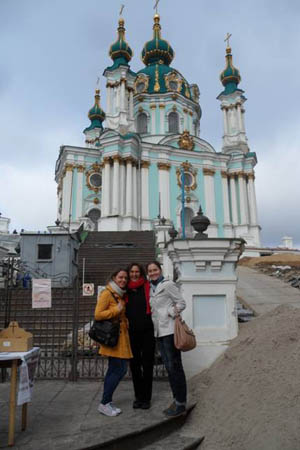
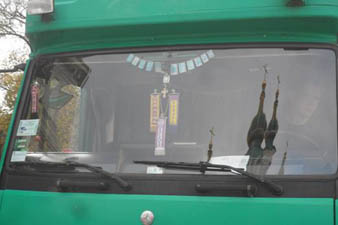
This truck was parked outside - you can see the reflection in the windscreen.

An elegant Kiev resident waiting for someone to open the door.

Street scene. Note the pretty painted wooden house in the background.
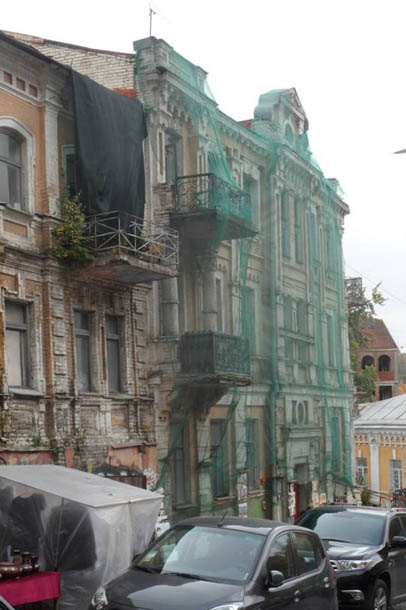
Faded grandeur...
... and grandeur which is brand new fake fin-de-siecle.
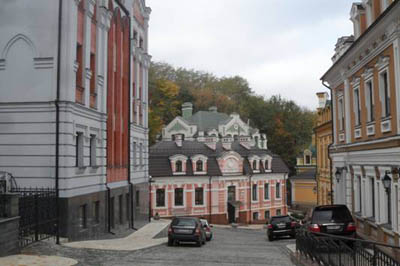
Kiev is set on several hills with steep wooded ravines.
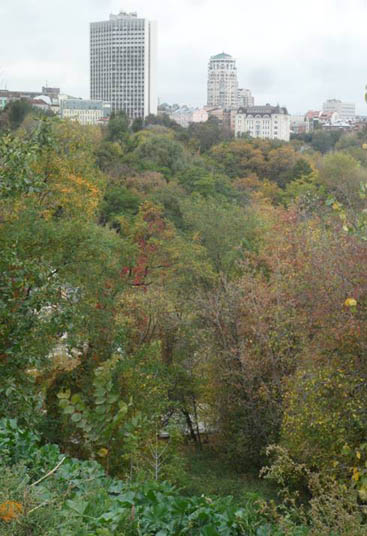
This is how we went up.

At the top was a park and children's playground called Landscape Park. Note the lovely old apartments dated 1902 1nd 1904 in the background.

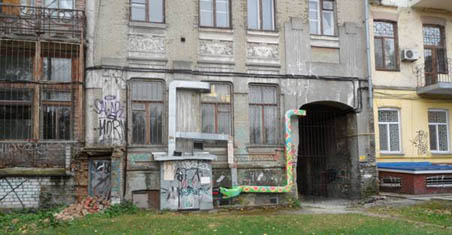
Close up, the apartments are almost derelict - but someone has painted drainpipes.
There were kids climbing all over the sculptures, and we joined in.
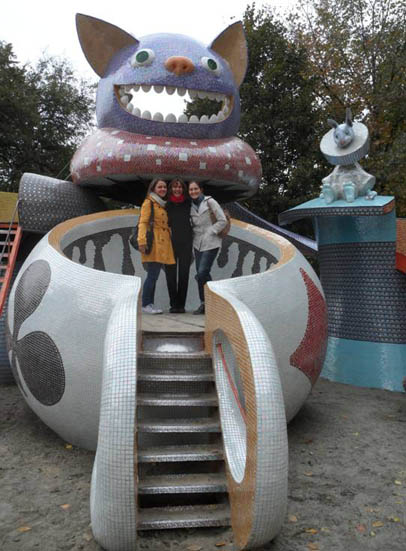
Then it was time for lunch. Pumpkin soup and red caviar pancake. Yum.

After lunch we went looking for the Pokrovsky convent; we couldn't find the school in the grounds where my Dad and his sister had been pupils.
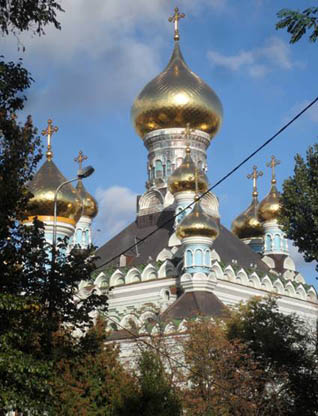
This is the Art History Institute, where Sophia's Mum works.

Our last visit was to St Sophia cathedral. The Byzantine painted interior is breathtaking. Photography is forbidden inside but I found this on the internet.
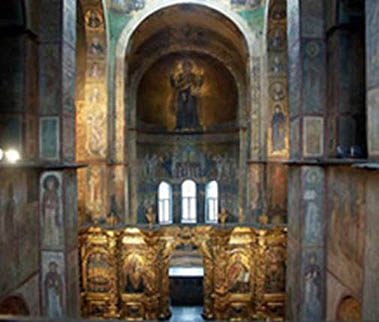
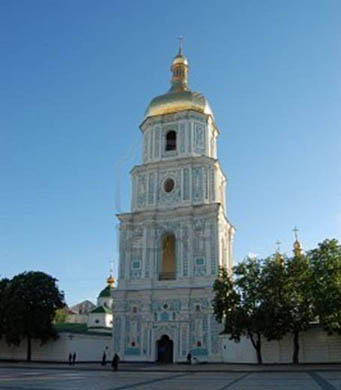
Thank you Victoria and Sophia for an amazing day out and to Sophia for taking the photos!
![]()
PEAK DISTRICT WALKS
Conversation between Raja Shehadeh and Marina Lewycka in the Peak District, September 2008
Novelist Marina Lewycka and author and human rights lawyer Raja Shehadeh met at the Orwell Prize in London in April 2008. Shehadeh's book
Palestine Walks: Notes on a vanishing landscape won the prize for which Lewycka's novel Two Caravans was also short listed. That initial meeting
led to a continued email correspondence, and two walks - one in Palestine near Ramallah in July, and one on Kinder Scout in the Peak District in September.
This conversation is an account of the second walk, a version of which was published in Political Quarterly in March 2009.
Read more

Here's a link to a little piece I wrote about the walk from North Lees Hall to Hathersage for the Guardian. The coach and horses are nothing to do with me. (I wish!)
http://www.guardian.co.uk/enjoy-england/authors-favourite-days-out

![]()
And another piece about one of my favourite Peak District Pubs, the Barrel Inn at Bretton
"On a cold day, when there's snow on the ground, there's nowhere nicer than the Barrel Inn at Bretton, near Eyam in the Peak District. The walk there is lovely, from Stoke Ford up through Bretton Clough, with a steepish climb at the end and a lovely bench halfway up, with a view through the treetops over to Abney, where you can catch your breath and share your snacks with the birds and the occasional mad sheep. And then, another half mile or so up the road, the Barrel Inn is waiting for you with a lovely blazing fire and a few blissed-out dogs slumped in front of it, and a traditional pub menu with massive helpings of everything, and always a selection of local beers. I recommend Green Abbot, but take care! The one problem is, you not only have to remember where you parked your car, you have to walk at least a mile back to it. Of course, you can just drive there, but it's not nearly so much fun."

![]()
From Wye Valley to Monyash
This lovely walk starts in the White Lodge car park on the A6 a mile west of Ashford in the Water. The footpath goes up from the back of the car park into Deep Dale.
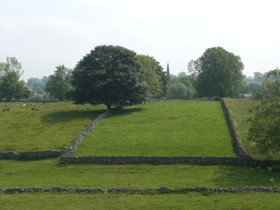 It's a lovely day in August; the car park was packed and the first part of the walk was teeming with people,
but at the first cross-roads they miraculously vanished away and most of the time, we had the footpath to ourselves.
Ashford-in-the-Water and Monsal Head are very popular beauty spots - but this walk through rolling meadows with
horizon-wide views all round is special in a different way. The climb is quite steep at first but soon levels out
into a lovely open chalky meadow, full of wild flowers and limestone outcrops. You follow a stream as you cross a number
of stiles and cross a small lane. At Hard Rake, slightly off the path to the left, there is a lily pond with a bench beside it -
perfect spot for lunch, before the path takes you round to the left of a woody plantation and down into Monyash.
It's a lovely day in August; the car park was packed and the first part of the walk was teeming with people,
but at the first cross-roads they miraculously vanished away and most of the time, we had the footpath to ourselves.
Ashford-in-the-Water and Monsal Head are very popular beauty spots - but this walk through rolling meadows with
horizon-wide views all round is special in a different way. The climb is quite steep at first but soon levels out
into a lovely open chalky meadow, full of wild flowers and limestone outcrops. You follow a stream as you cross a number
of stiles and cross a small lane. At Hard Rake, slightly off the path to the left, there is a lily pond with a bench beside it -
perfect spot for lunch, before the path takes you round to the left of a woody plantation and down into Monyash.
Although Monyash is a busy village, with a pretty green and market cross, a splendid café, and a popular pub, it has a couple of little-known delights. One is the old Quaker meeting room and burial ground - you can reach it through a rather derelict wooden five-bar gate on your right as you walk into the village. The other is the village pond, a little way along Rakes Road on your left. Occasionally you get a few locals fishing there, but today there were just half a dozen drowsy ducks, who couldn't even be bothered to stir themselves for a crust of ciabatta left over from lunch.
The route back to the car park is through Sheldon, a very quiet village, in contrast to Monyash. We were the only people in the pub (the Cock and Bull) where they sell Theakestones and Hartington beers as well as Black Sheep and the usual assortment of lagers.
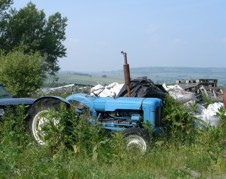 One reason I wanted to visit Sheldon is that last time I was there I spotted a lovely old Ferguson apparently abandoned under a hedge.
When I went to check on it this time, it had gone, but there was an elderly John Deere parked up close to the spot. I asked an
old man digging up thistles in a field nearby what had happened to the old blue tractor, and why this other green tractor had
appeared, but he looked at me as though I was completely mad, and muttered a reply which I couldn't understand - maybe just as well.
One reason I wanted to visit Sheldon is that last time I was there I spotted a lovely old Ferguson apparently abandoned under a hedge.
When I went to check on it this time, it had gone, but there was an elderly John Deere parked up close to the spot. I asked an
old man digging up thistles in a field nearby what had happened to the old blue tractor, and why this other green tractor had
appeared, but he looked at me as though I was completely mad, and muttered a reply which I couldn't understand - maybe just as well.
The route back to the car park takes you past a number of abandoned lead mines (you can find out about lead mining in Derbyshire on http://www.pdmhs.com/default.asp). As you get back into Deep Dale the path gets very steep and slippery. Although I knew this, and had come prepared with a walking stick, I still managed to slip on my bum in the mud. It could have had something to do with the Hartington, so be warned.
Ours was the only car left in the car park by the time we got back, at seven o'clock, muddy, exhausted, bleeding (well, just a little graze) to wind our way back to Sheffield.

![]()
Conversation between Raja Shehadeh and Marina Lewycka in the Peak District, September 2008
ML![]() Raja, what I really liked about your book is that it wasn't simply an account of the history and politics of
your country, it was very much about you as a human being. You described the walks so vividly, I could picture you, out there, living and feeling
through the experiences of each walk, like a kind of meditation on the landscape. And one thing that struck me was that you and I share a passion
for walking. So my first impulse when I finished your book was to invite you to come to the Peak District, near Sheffield, where I like to walk.
For me as a writer, walking is important because it's my time for reflection and consolidation of ideas and I wanted to share that with you.
I also had an ulterior motive. The book I'm currently writing (We Are All Made of Glue) is partly about the Middle East, so I wanted to come to
Ramallah and to walk with you - to get a feel for the topography and the flora that would feature in my book. So that is our starting point.
Raja, what I really liked about your book is that it wasn't simply an account of the history and politics of
your country, it was very much about you as a human being. You described the walks so vividly, I could picture you, out there, living and feeling
through the experiences of each walk, like a kind of meditation on the landscape. And one thing that struck me was that you and I share a passion
for walking. So my first impulse when I finished your book was to invite you to come to the Peak District, near Sheffield, where I like to walk.
For me as a writer, walking is important because it's my time for reflection and consolidation of ideas and I wanted to share that with you.
I also had an ulterior motive. The book I'm currently writing (We Are All Made of Glue) is partly about the Middle East, so I wanted to come to
Ramallah and to walk with you - to get a feel for the topography and the flora that would feature in my book. So that is our starting point.
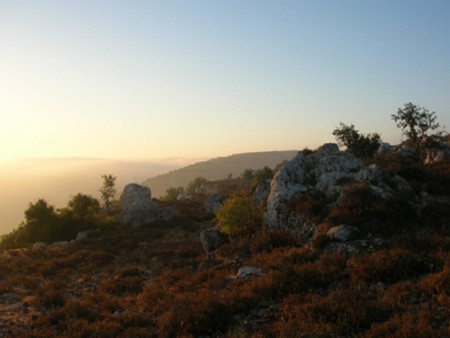
Dawn in the hills north of Ramallah
RS![]() Walking has played an important part in my life. As you rightly say it is a time for meditation and turning
thoughts over. It's always good to walk away from one's locale so you can reflect on it. Through the course of our walk yesterday I got the opportunity
to think of the differences between our two areas and our two lives and the relationship between us and the land surrounding us and how the changes in
the land reflect the political situation. But I want to start with the train journey Penny and I took, from Edinburgh (where I'm spending my vacation)
to Sheffield, which was of course very easy because there was no border between Scotland and England. When I waited for you to come from Jerusalem to
Ramallah, I was very anxious because there are lots of reasons for anxiety. There is the checkpoint at Kalandia, which may or may not allow you in and
anything can happen on the way. There are so many imponderables and surprises so that there was a great sense of achievement when you finally arrived in
Ramallah.
Walking has played an important part in my life. As you rightly say it is a time for meditation and turning
thoughts over. It's always good to walk away from one's locale so you can reflect on it. Through the course of our walk yesterday I got the opportunity
to think of the differences between our two areas and our two lives and the relationship between us and the land surrounding us and how the changes in
the land reflect the political situation. But I want to start with the train journey Penny and I took, from Edinburgh (where I'm spending my vacation)
to Sheffield, which was of course very easy because there was no border between Scotland and England. When I waited for you to come from Jerusalem to
Ramallah, I was very anxious because there are lots of reasons for anxiety. There is the checkpoint at Kalandia, which may or may not allow you in and
anything can happen on the way. There are so many imponderables and surprises so that there was a great sense of achievement when you finally arrived in
Ramallah.
ML![]() I could feel that sense of achievement too. I didn't feel the anxiety, but what I felt as soon as I stepped
onto the number 18 bus in East Jerusalem, was that I had stepped into a completely different world. It can't have been like that for you stepping on
the train in Edinburgh.
I could feel that sense of achievement too. I didn't feel the anxiety, but what I felt as soon as I stepped
onto the number 18 bus in East Jerusalem, was that I had stepped into a completely different world. It can't have been like that for you stepping on
the train in Edinburgh.
RS![]() Well, first of all we first have to consult Google Earth in order to make sure that the path we are going to
take on the walk has not been invaded by new settlements. If there are settlers in the course of our path we are in for trouble. For example if we have
a Swiss knife or any kind of knife is found on us, we could be arrested. The soldiers would claim that we brought the knife to use it to attack them. So,
we have to make sure that everything we pack can be explained and will not give us problems at the checkpoints.And I thought about the many differences
between our Peak District walk, and our walk near Ramallah. For one thing, as we prepared for our walk we only had to worry about what the
weather was going to be like, where as you had to worry about ...
Well, first of all we first have to consult Google Earth in order to make sure that the path we are going to
take on the walk has not been invaded by new settlements. If there are settlers in the course of our path we are in for trouble. For example if we have
a Swiss knife or any kind of knife is found on us, we could be arrested. The soldiers would claim that we brought the knife to use it to attack them. So,
we have to make sure that everything we pack can be explained and will not give us problems at the checkpoints.And I thought about the many differences
between our Peak District walk, and our walk near Ramallah. For one thing, as we prepared for our walk we only had to worry about what the
weather was going to be like, where as you had to worry about ...
Edale village
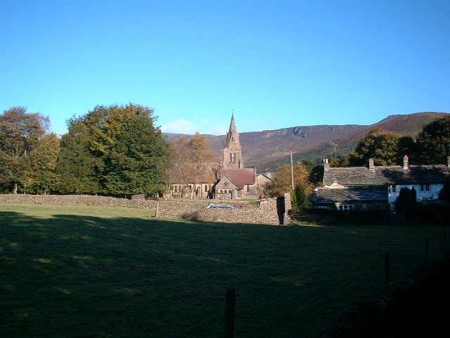
Photograph courtesy of ANDY WALLACE
ML![]() We start our walk at Edale village, which is towards the end of the Hope Valley, clustered around Crowden Brook.
I remember in your book you describe how the Palestinian villages are also down in the valleys near the water, like the villages in the Peak District,
whereas the new Israeli settlements on the West Bank straddle the hilltops. When we walked at Dura Kara'a we met with the other walkers at 5.30am -
that came as quite a shock - in the central square at Ramallah so we could see the sun rise and finish our walk before it got too hot. The hills were
all touched with pink and gold, the limestone rocks were gleaming and the sky was beginning to lighten. It was beautiful and magical. I've got the
photos of you, Raja, standing there looking at the sunrise. This was what I'd come to see - the Biblical landscape I want to describe in my next novel.
But as we walked between the rocks and thorn bushes, there was suddenly a point at which we climbed along a rise, and there in front of us on the
opposite hillside was this huge brick and barbed wire thing spreading out over the top of the hill like a horrible growth in the middle of this
ancient landscape. And you know, even setting aside the politics, it was just so brutally ugly, this outcrop of brick and tiles, floodlit,
surrounded by barbed wire with watch towers at regular intervals. This was my first sight of an Israeli settlement.
We start our walk at Edale village, which is towards the end of the Hope Valley, clustered around Crowden Brook.
I remember in your book you describe how the Palestinian villages are also down in the valleys near the water, like the villages in the Peak District,
whereas the new Israeli settlements on the West Bank straddle the hilltops. When we walked at Dura Kara'a we met with the other walkers at 5.30am -
that came as quite a shock - in the central square at Ramallah so we could see the sun rise and finish our walk before it got too hot. The hills were
all touched with pink and gold, the limestone rocks were gleaming and the sky was beginning to lighten. It was beautiful and magical. I've got the
photos of you, Raja, standing there looking at the sunrise. This was what I'd come to see - the Biblical landscape I want to describe in my next novel.
But as we walked between the rocks and thorn bushes, there was suddenly a point at which we climbed along a rise, and there in front of us on the
opposite hillside was this huge brick and barbed wire thing spreading out over the top of the hill like a horrible growth in the middle of this
ancient landscape. And you know, even setting aside the politics, it was just so brutally ugly, this outcrop of brick and tiles, floodlit,
surrounded by barbed wire with watch towers at regular intervals. This was my first sight of an Israeli settlement.
RS![]() But even before we started the walk, if you remember, we had to go through a narrow side road through Al Bireh,
which is a sister town to Ramallah, towards Nablus to get to the start of our walk. For a long time Ramallah and Jerusalem, in the centre of the West Bank,
have been connected via an old road to Nablus, which is a major commercial centre in the north of the West Bank. Then the Israeli settlement of Beit Eil
was established north of Ramallah. Until 2000, it was possible to use this road, though driving on it you saw how the settlement was increasing and
expanding towards the road. And you felt despair about the future. Then at a certain point the settlers decided it was unsafe for them to have Palestinian
traffic pass on that road. So this road, which was a main artery connecting the two parts of the West Bank, was closed. This was why we had to use a narrow
side road which had more traffic than it was designed for. Every time I go on that road I think what every other Palestinian must also be thinking,
"why are we being punished for that settlement?" And how are the people who are living in this settlement feeling when they are making our lives, on a
daily basis, miserable?
But even before we started the walk, if you remember, we had to go through a narrow side road through Al Bireh,
which is a sister town to Ramallah, towards Nablus to get to the start of our walk. For a long time Ramallah and Jerusalem, in the centre of the West Bank,
have been connected via an old road to Nablus, which is a major commercial centre in the north of the West Bank. Then the Israeli settlement of Beit Eil
was established north of Ramallah. Until 2000, it was possible to use this road, though driving on it you saw how the settlement was increasing and
expanding towards the road. And you felt despair about the future. Then at a certain point the settlers decided it was unsafe for them to have Palestinian
traffic pass on that road. So this road, which was a main artery connecting the two parts of the West Bank, was closed. This was why we had to use a narrow
side road which had more traffic than it was designed for. Every time I go on that road I think what every other Palestinian must also be thinking,
"why are we being punished for that settlement?" And how are the people who are living in this settlement feeling when they are making our lives, on a
daily basis, miserable?
ML![]() But I am sure they have no feelings about this - they don't think about it. I was struck by how little awareness the people who live in Israel
have of the daily lives of the people who live in Palestine. They don't talk about it. And I don't think they think about it.
But I am sure they have no feelings about this - they don't think about it. I was struck by how little awareness the people who live in Israel
have of the daily lives of the people who live in Palestine. They don't talk about it. And I don't think they think about it.
RS![]() The majority of the Israelis have not visited East Jerusalem, let alone the West Bank, for decades so they don't care. But as you saw when
we went on our walk, this settlement of Beit Eil is so close to the Arab housing nearby that in some cases if the villagers near Beit Eil look out
of their windows, a few metres away they see the settlement. Every time I go on that walk, I see that the settlement is expanding towards the
Palestinian village.
The majority of the Israelis have not visited East Jerusalem, let alone the West Bank, for decades so they don't care. But as you saw when
we went on our walk, this settlement of Beit Eil is so close to the Arab housing nearby that in some cases if the villagers near Beit Eil look out
of their windows, a few metres away they see the settlement. Every time I go on that walk, I see that the settlement is expanding towards the
Palestinian village.
ML![]() I started to imagine straight away what it would be like if I was walking in the Peak District and suddenly I turned around a corner and I
saw something like this on one of the hills in front of me. You must see this every day and it makes you angry.
I started to imagine straight away what it would be like if I was walking in the Peak District and suddenly I turned around a corner and I
saw something like this on one of the hills in front of me. You must see this every day and it makes you angry.
RS![]() Yes. That's the horror of it. You go out for a walk in order to leave everything behind and in most cases you meet confrontation, physical,
visual confrontation with these settlements and you are pervaded by a great fear of the future. That's what it is, fear of the future. The way
Israel is going about it, and the enmity and the violence and the refusal even to abide by their own laws on land use planning, you cannot but
come to the conclusion that it is going to be either us or them. They are not there on the basis of finding a way of living together, coexisting
with Palestinians.
Yes. That's the horror of it. You go out for a walk in order to leave everything behind and in most cases you meet confrontation, physical,
visual confrontation with these settlements and you are pervaded by a great fear of the future. That's what it is, fear of the future. The way
Israel is going about it, and the enmity and the violence and the refusal even to abide by their own laws on land use planning, you cannot but
come to the conclusion that it is going to be either us or them. They are not there on the basis of finding a way of living together, coexisting
with Palestinians.
I had another walk after you left where I went down to a village called A'yn Qenya. Nearby on top of the hill is the settlement of Dolev, which is one of the earliest settlements in the Ramallah hills. I choose my path carefully to avoid the settlement and had a lovely walk. But once I got to the village I found two settlers in a car in the main square of the village. When they saw me they said "what are you doing here?" and I said "walking". "Where are you from?" I thought at first they thought I was a settler who had lost his way so I said "I live in Ramallah, it's over there", in other words, don't worry, I know where I am. And they said "Why are you here? We want to see your identification card."
ML![]() So a settler has the right, he doesn't even have to be a police officer ...
So a settler has the right, he doesn't even have to be a police officer ...
RS![]() Some settlers are given the right by military orders to make arrests to act as policemen.
Some settlers are given the right by military orders to make arrests to act as policemen.
ML![]() And they are armed?
And they are armed?
RS![]() Of course, they are armed. So these settlers said "We are going to call the army and we want to see your identity card" and so on. At first
I was taken aback because I wasn't ready for this and then I said "Who are you and what are you doing here?" And the answer was "we live here.
Unlike you we really live here." And I thought this was absolute confirmation that for them it is either us or them.
Of course, they are armed. So these settlers said "We are going to call the army and we want to see your identity card" and so on. At first
I was taken aback because I wasn't ready for this and then I said "Who are you and what are you doing here?" And the answer was "we live here.
Unlike you we really live here." And I thought this was absolute confirmation that for them it is either us or them.
The Oslo Accords only helped them confirm the new map of the region they have been working on for years. Prior to Oslo, many in Israel were reluctant to accept the huge economic advantages and incentives that were being offered to them and move to the settlements in the West Bank. All those amazing adverts inviting you to enjoy a beautiful home and garden with a view of the hills and tax exemptions, from which you could get to work in no time because the roads are so well made and so on, went unanswered. By and large most Israelis said no to settling the Occupied Territories.
ML![]() Which is a great cause for optimism I think.
Which is a great cause for optimism I think.
RS![]() But then, after '93, settlements speeded up and they doubled in number. With the increase in settlements, the magnitude of the problem also
increased. Since I have been working as a lawyer in human rights, I have been following the process. I saw how, before Oslo, the Israelis went
about devising land zoning schemes of the West Bank to create a new map. By the time of the start of the negotiations in 1991 they were ready.
Planning schemes for the settlements allowed for massive expansion while those for the Palestinian inhabited areas restricted growth and development.
These plans were confirmed by the Oslo Accords. The newly created Palestinian Authority had no legal power to amend them.
But then, after '93, settlements speeded up and they doubled in number. With the increase in settlements, the magnitude of the problem also
increased. Since I have been working as a lawyer in human rights, I have been following the process. I saw how, before Oslo, the Israelis went
about devising land zoning schemes of the West Bank to create a new map. By the time of the start of the negotiations in 1991 they were ready.
Planning schemes for the settlements allowed for massive expansion while those for the Palestinian inhabited areas restricted growth and development.
These plans were confirmed by the Oslo Accords. The newly created Palestinian Authority had no legal power to amend them.
ML![]() And that was the area we were walking in?
And that was the area we were walking in?
RS![]() Alas that feeling of being able to be in the land without any possible unpleasant encounters, without any of
these visual intrusions, is gone. And I thought we were protected in Ramallah because the land around Ramallah is fully registered and so they couldn't
take it using the ploy of public land. But now forty percent of the settlements are illegal by Israeli standards and settlements are mushrooming around
Ramallah on areas that are fully privately owned. Nobody cares, nobody stops them and government keeps saying that illegal settlements under Israeli law
will be removed. They are never removed. We are constantly meeting more settlers here and there - more roads, more machinery which is used to change the
land. It's a nightmare.
Alas that feeling of being able to be in the land without any possible unpleasant encounters, without any of
these visual intrusions, is gone. And I thought we were protected in Ramallah because the land around Ramallah is fully registered and so they couldn't
take it using the ploy of public land. But now forty percent of the settlements are illegal by Israeli standards and settlements are mushrooming around
Ramallah on areas that are fully privately owned. Nobody cares, nobody stops them and government keeps saying that illegal settlements under Israeli law
will be removed. They are never removed. We are constantly meeting more settlers here and there - more roads, more machinery which is used to change the
land. It's a nightmare.
The kissing gate at the start of the Pennine Way
ML![]() These gates are supposed to prevent sheep from running away, but to let people through one a time. In that respect, they are a bit like the
turnstiles at checkpoints which are supposed to safeguard the settlers and the citizens of Israel. I was surprised to find that I didn't need any
security clearance to get from Jerusalem to Ramallah, to join you on the walk, but on the way back to Jerusalem I had to go through the famous Kalandia
checkpoint. There was a delay of twenty minutes, and in England you can wait twenty minutes for a bus or for a missed train, so it didn't bother me.
But I could see all the Palestinians in the queue were getting tense and agitated. They started rattling the gate and shouting.
These gates are supposed to prevent sheep from running away, but to let people through one a time. In that respect, they are a bit like the
turnstiles at checkpoints which are supposed to safeguard the settlers and the citizens of Israel. I was surprised to find that I didn't need any
security clearance to get from Jerusalem to Ramallah, to join you on the walk, but on the way back to Jerusalem I had to go through the famous Kalandia
checkpoint. There was a delay of twenty minutes, and in England you can wait twenty minutes for a bus or for a missed train, so it didn't bother me.
But I could see all the Palestinians in the queue were getting tense and agitated. They started rattling the gate and shouting.
RS![]() RS We have to brace ourselves for the possibility that at one of the many checkpoints, (although checkpoint
is the wrong name because it is not to check documents but to harass), which surround Ramallah, there can be delays. The soldiers might be in the kind
of mood where they want to simply harass or delay or stop us from passing without giving reasons because they have the right to do so. What is
especially annoying is the absence of published rules of conduct for the soldiers at checkpoints, which would make it possible for you to say: "now
you've broken the rules, now you've gone beyond what is acceptable". They can make the rules up as they go, so they can say we suspect this person
and they can simply ask you to step aside and wait. And you can wait for hours without any explanation, without any recourse to higher authority.
Or, and this is very important, they can simply take away your identification card.
RS We have to brace ourselves for the possibility that at one of the many checkpoints, (although checkpoint
is the wrong name because it is not to check documents but to harass), which surround Ramallah, there can be delays. The soldiers might be in the kind
of mood where they want to simply harass or delay or stop us from passing without giving reasons because they have the right to do so. What is
especially annoying is the absence of published rules of conduct for the soldiers at checkpoints, which would make it possible for you to say: "now
you've broken the rules, now you've gone beyond what is acceptable". They can make the rules up as they go, so they can say we suspect this person
and they can simply ask you to step aside and wait. And you can wait for hours without any explanation, without any recourse to higher authority.
Or, and this is very important, they can simply take away your identification card.
The identity card plays a very important role in our lives. First of all the law is that you cannot move anywhere without having an identity card on you, so if the identity card is taken, then the process of retrieving it can be difficult and agonising. I was once accompanying my friend Mustafa Barghouti during his election campaign in Jerusalem and we had a press conference at the Seven Pillars Hotel on the Mount of Olives. President Carter, who had come to observe the elections, was there. We met with him and then Mustafa was going to go down to the old city to pray at the Al Aqsa Mosque. I rather reluctantly accompanied him. Of course the police was in force, and they stopped us at one of the gates to the old city and said immediately "give me your identity card". You can't say "no", so I gave the policeman the identity card and he proceeded to arrest Mustafa and shove him in the police car. Now the person who took my identity card went with Mustafa. I was not arrested, they did not bother with me, but they did take my card. I then went around the police stations begging for information as to where on earth was my identity card. Without it I cannot move around. It turned out that this policeman disdainfully threw my card into the car and didn't bother with it. Mustafa noticed that it was on the floor, picked it up, put it in his pocket and kept it for me. If it had stayed in the car, it would have taken months if not forever to find it. If Mustafa hadn't found it and I needed to reissue a new card, it would have been a huge procedure which would have consumed my time and energy for weeks and weeks. Huge problems. So you are at the mercy of any and every single puny soldier who might be a mere eighteen year old, and he or she can make your life hell for at least a month or two or more, for no reason, by simply taking your identity card.
ML![]() Yes, I was struck by how very young the guard and soldiers are. That stint in the army teaches them, I suppose, how to behave towards Palestinians.
Yes, I was struck by how very young the guard and soldiers are. That stint in the army teaches them, I suppose, how to behave towards Palestinians.
RS![]() I have a doctor friend who is a surgeon, a urologist, and he was going to Jerusalem to Augusta Victoria
Hospital to operate. He was stopped in the Kalandia and asked to wait. He had to wait for two hours for no reason. He was telling them, "I have
a patient waiting for me to be operated on. Let me pass". He had all the right papers, he was a doctor. He had to wait for two hours - no reason,
no explanation.
I have a doctor friend who is a surgeon, a urologist, and he was going to Jerusalem to Augusta Victoria
Hospital to operate. He was stopped in the Kalandia and asked to wait. He had to wait for two hours for no reason. He was telling them, "I have
a patient waiting for me to be operated on. Let me pass". He had all the right papers, he was a doctor. He had to wait for two hours - no reason,
no explanation.
There is also something else which is wicked. When they made the turnstiles that every Palestinian has to go through, they ordered turnstiles which were narrower than the ordinary turnstiles so that people who are obese or are pregnant or who are carrying children have a very difficult time and some of them get stuck in the process. Now why on earth did they order turnstiles like this? OK, you may need turnstiles on security grounds but what is the explanation for narrower turnstiles? It's just wickedness. Just to make life more difficult for the Palestinians.
And the stupidity is that this is all done without any due consideration, that these two people, the Israelis and Palestinians are in such close proximity that ultimately they need to make friends, they need to find a way to live together. But there is no indication whatsoever that in the way the Israeli government is operating, and especially in the Occupied Territories, they are thinking in terms of a peaceful future with the Palestinians.
Then they thought that the areas of possible confrontation where there could be some interaction were these over six hundred checkpoints that are all over the West Bank. So, what they are doing now is privatising these checkpoints and they are given over to security companies to run them. It is somebody doing a job for profit. There is a disembodied voice in Hebrew, not in Arabic, speaking to you about what to do and if you haven't been before and you don't speak Hebrew… You ask, what should I do? And if you delay, you are screamed at. It is complete dehumanising.ML![]() At Kalandia the process had been dehumanised in the sense that it is fully mechanised. You put your stuff on
a belt, you passed through a metal turnstile, you hear voices speaking to you from microphones and then you get a couple of young lads of eighteen
sitting behind two or three sheets of glass and you slide your passport under or hold it up against the glass. It's like being on a conveyer belt,
part of a mechanical process.
At Kalandia the process had been dehumanised in the sense that it is fully mechanised. You put your stuff on
a belt, you passed through a metal turnstile, you hear voices speaking to you from microphones and then you get a couple of young lads of eighteen
sitting behind two or three sheets of glass and you slide your passport under or hold it up against the glass. It's like being on a conveyer belt,
part of a mechanical process.
RS![]() It is of course a psychological trick by the Israelis to portray their side as all powerful in order to put the Palestinians in
awe and frighten them into submission.
It is of course a psychological trick by the Israelis to portray their side as all powerful in order to put the Palestinians in
awe and frighten them into submission.
Jacob's Ladder
ML![]() Raja, you are a lawyer and you think in terms of rights and law and justice. But I'm a novelist, and what
I think about when I see these encounters is what has happened in people's hearts. How is this possible, this lack of human feeling? How has it
so completely broken down? What perplexed me most was wondering whether the cruel and arbitrary behaviour Israelis were now imposing on the
hapless people of Palestine were in some indirect way an effect of the holocaust. This is a question that troubled me so much I set out to
write a book about it, just in order to find out for myself.
Raja, you are a lawyer and you think in terms of rights and law and justice. But I'm a novelist, and what
I think about when I see these encounters is what has happened in people's hearts. How is this possible, this lack of human feeling? How has it
so completely broken down? What perplexed me most was wondering whether the cruel and arbitrary behaviour Israelis were now imposing on the
hapless people of Palestine were in some indirect way an effect of the holocaust. This is a question that troubled me so much I set out to
write a book about it, just in order to find out for myself.
RS![]() It has been very difficult for me to confront this and it is a constant struggle. I am an optimist by nature and I think that evil is a
corruption of good. If you can get to the good of a person, then you wouldn't have evil. But I cannot help it and maybe eventually I will learn
to see better the force and power of ideology - the colonialism which doesn't seem to be any different from colonial experiences of earlier times.
I've had situations, especially at checkpoints and barriers, where normally I am very calm because there is no point in getting worked up, because
it doesn't do any good. But sometimes I lose my patience and begin to scream and shout. At one point I was thinking what they are doing is mad and
I felt it my responsibility to inform these soldiers that they need psychological treatment, because a normal person would not behave in this manner.
I said this very forcefully in an attempt at communicating and they looked at me without any comprehension, no possibility of beginning to listen and
I understood that the definition of racism is that the other is not a fellow human being - therefore you don't listen to him, you don't accept
anything from him.
It has been very difficult for me to confront this and it is a constant struggle. I am an optimist by nature and I think that evil is a
corruption of good. If you can get to the good of a person, then you wouldn't have evil. But I cannot help it and maybe eventually I will learn
to see better the force and power of ideology - the colonialism which doesn't seem to be any different from colonial experiences of earlier times.
I've had situations, especially at checkpoints and barriers, where normally I am very calm because there is no point in getting worked up, because
it doesn't do any good. But sometimes I lose my patience and begin to scream and shout. At one point I was thinking what they are doing is mad and
I felt it my responsibility to inform these soldiers that they need psychological treatment, because a normal person would not behave in this manner.
I said this very forcefully in an attempt at communicating and they looked at me without any comprehension, no possibility of beginning to listen and
I understood that the definition of racism is that the other is not a fellow human being - therefore you don't listen to him, you don't accept
anything from him.
ML![]() That is true, but I think it is sometimes simply a failure of the imagination. To be able to imagine what
it is like to be another human being is a huge step forward that some people are unable to make. That is why it is wonderful to be able to write,
to create characters and to invite people to make those imaginary steps, to see the world though another person's eyes. They might do this with a
book but not yet be able to do so in real life. Then maybe next time they will meet someone in everyday life, and they can also take that step of
imagination.
That is true, but I think it is sometimes simply a failure of the imagination. To be able to imagine what
it is like to be another human being is a huge step forward that some people are unable to make. That is why it is wonderful to be able to write,
to create characters and to invite people to make those imaginary steps, to see the world though another person's eyes. They might do this with a
book but not yet be able to do so in real life. Then maybe next time they will meet someone in everyday life, and they can also take that step of
imagination.
RS![]() I think you are perfectly right and I think that had things not moved in the way they did after Oslo
and the changes in the second Intifada which also brought about more misery and more entrenchment of the separation between the two people,
things would have been different. The Palestinians and Israelis despite all the difficulties were getting to meet each other, not on an equal
basis, sometimes as workers working in Israel or Israelis visiting, but they moved back and forth. Now the policy of Israel is to divide the two,
so the possibility of people discovering the humanity of the other is actually less. The Israelis are not allowed by law to cross into the
Occupied Territories.
I think you are perfectly right and I think that had things not moved in the way they did after Oslo
and the changes in the second Intifada which also brought about more misery and more entrenchment of the separation between the two people,
things would have been different. The Palestinians and Israelis despite all the difficulties were getting to meet each other, not on an equal
basis, sometimes as workers working in Israel or Israelis visiting, but they moved back and forth. Now the policy of Israel is to divide the two,
so the possibility of people discovering the humanity of the other is actually less. The Israelis are not allowed by law to cross into the
Occupied Territories.
ML![]() So an Israeli cannot go to Ramallah as I did?
So an Israeli cannot go to Ramallah as I did?
RS![]() No. Though despite the legal prohibition some still do, because they don't believe in it and there are many ways of doing it. But it is illegal.
An Israeli crossing into Area A can be arrested because he/she has broken the law.
No. Though despite the legal prohibition some still do, because they don't believe in it and there are many ways of doing it. But it is illegal.
An Israeli crossing into Area A can be arrested because he/she has broken the law.
ML![]() That is a great pity. When I was in Jerusalem, on my last day, I went walking up onto the Mount of Olives. I had a lovely view down to
Jerusalem, I could see the Dome of the Rock and the ancient circle of walls. I got chatting with a group of international students up there,
and told them that I had been in Ramallah. They were completely shocked. "How could you do that? We've been told it's really dangerous and
almost impossible." "No," I said, "you just have to get on a number 18 bus". They had been told, as I was told when I travelled on the bus to
Lod, near Tel Aviv, that if you get off the bus in a Palestinian area, you'll be murdered, raped, robbed, and of course none of this happened.
This fear has been built up in them, and because there is no contact, people have no way of overcoming that fear. It becomes a huge myth. I think
the wall is the worst thing, because it keeps people apart in perpetuity, keeps them from ever recognising each other's humanity. After a conflict,
if people have to live together as neighbours, after a while, they just get used to each other. Even if they don't love each other, at least they
find ways of living together. And then, as always happens, young people fall in love and get married like Romeo and Juliet, and families get mixed
up and in the end it all gets smoothed over. Now that can't happen between Israel and Palestine. I felt a great sense of despair.
That is a great pity. When I was in Jerusalem, on my last day, I went walking up onto the Mount of Olives. I had a lovely view down to
Jerusalem, I could see the Dome of the Rock and the ancient circle of walls. I got chatting with a group of international students up there,
and told them that I had been in Ramallah. They were completely shocked. "How could you do that? We've been told it's really dangerous and
almost impossible." "No," I said, "you just have to get on a number 18 bus". They had been told, as I was told when I travelled on the bus to
Lod, near Tel Aviv, that if you get off the bus in a Palestinian area, you'll be murdered, raped, robbed, and of course none of this happened.
This fear has been built up in them, and because there is no contact, people have no way of overcoming that fear. It becomes a huge myth. I think
the wall is the worst thing, because it keeps people apart in perpetuity, keeps them from ever recognising each other's humanity. After a conflict,
if people have to live together as neighbours, after a while, they just get used to each other. Even if they don't love each other, at least they
find ways of living together. And then, as always happens, young people fall in love and get married like Romeo and Juliet, and families get mixed
up and in the end it all gets smoothed over. Now that can't happen between Israel and Palestine. I felt a great sense of despair.
RS![]() RS Let's go back to the walk.
RS Let's go back to the walk.
Onto Kinder Scout
ML![]() One reason I wanted to bring you to the Peak District was to take you up on to Kinder Scout. Like Palestine,
it is land that has historically been disputed - it was previously common and that had been enclosed for sheep grazing during the agricultural
revolution, and is now used mostly for grouse shooting for a few months of the year. It is a huge tract of open land between the conurbations of
Manchester and Sheffield where working people were living in very poor and crowded conditions from the nineteenth century onwards, and so it was for
them a natural area of recreation, from which they were barred. But in 1932 there was a mass trespass, in which contingents of walkers from Sheffield
and Manchester disobeyed the law and walked up onto Kinder converging a little way to the north of here. They got into a confrontation with the
game keepers of the local landowners, and some were imprisoned. But it was an awakening, and the start of a movement to reclaim the right to walk
on the hills. I'm a member of the Ramblers Association which grew out of that, and which campaigns for free access to the countryside.
One reason I wanted to bring you to the Peak District was to take you up on to Kinder Scout. Like Palestine,
it is land that has historically been disputed - it was previously common and that had been enclosed for sheep grazing during the agricultural
revolution, and is now used mostly for grouse shooting for a few months of the year. It is a huge tract of open land between the conurbations of
Manchester and Sheffield where working people were living in very poor and crowded conditions from the nineteenth century onwards, and so it was for
them a natural area of recreation, from which they were barred. But in 1932 there was a mass trespass, in which contingents of walkers from Sheffield
and Manchester disobeyed the law and walked up onto Kinder converging a little way to the north of here. They got into a confrontation with the
game keepers of the local landowners, and some were imprisoned. But it was an awakening, and the start of a movement to reclaim the right to walk
on the hills. I'm a member of the Ramblers Association which grew out of that, and which campaigns for free access to the countryside.
Normally when I walk, though, I like to be on my own, to enjoy solitude and feel close to nature. But one of the wonderful things about this walk is there are so many people out and about up here - people of all ages, thin people, fat people, people walking with their dogs, with children, people with their grannies. Everyone goes out there walking on land which seventy years ago, was out of bounds to them. Whenever I go on to Kinder Scout, I always feel a great sense of optimism and triumph of the human spirit and I wanted you to feel some of that as well. I don't know if you did feel it, Raja.
RS![]() Nothing moves me more than beholding the human spirit in its pursuit of freedom. It is always so
wonderful to come to a new place and experience acts of resistance by other people under such different circumstances. It confirms our common
humanity. You came to the Palestinian Territories and walked with us and felt some of the things that we were feeling. Even though we come
from very different backgrounds the search for justice unites us. This is what makes us human. On the walk today we came across so many
walkers who greeted us very nicely when they passed, whom you felt were simply enjoying the nature as we were. This was so unlike the encounters
with the settlers which we sometimes have. The interesting thing was the use of the dogs. Here the dogs are so happy, wagging their tails and
just loving being out. We had a confrontation in one of our walks with a settler in 4 x4 and he had two ferocious dogs in the back and a pistol
and a machine gun. He stopped us and said "what are you doing" and then arrested us until the army came. Instead of having happy dogs roaming
around, he had these two ferocious dogs locked up in the back of his car which he felt he needed for protection in addition to his weaponry. He
seemed very happy to have found someone to annoy and to assert himself over. It is such a difference.
Nothing moves me more than beholding the human spirit in its pursuit of freedom. It is always so
wonderful to come to a new place and experience acts of resistance by other people under such different circumstances. It confirms our common
humanity. You came to the Palestinian Territories and walked with us and felt some of the things that we were feeling. Even though we come
from very different backgrounds the search for justice unites us. This is what makes us human. On the walk today we came across so many
walkers who greeted us very nicely when they passed, whom you felt were simply enjoying the nature as we were. This was so unlike the encounters
with the settlers which we sometimes have. The interesting thing was the use of the dogs. Here the dogs are so happy, wagging their tails and
just loving being out. We had a confrontation in one of our walks with a settler in 4 x4 and he had two ferocious dogs in the back and a pistol
and a machine gun. He stopped us and said "what are you doing" and then arrested us until the army came. Instead of having happy dogs roaming
around, he had these two ferocious dogs locked up in the back of his car which he felt he needed for protection in addition to his weaponry. He
seemed very happy to have found someone to annoy and to assert himself over. It is such a difference.
ML![]() But you can understand that Israelis feel insecure. I was in Tel Aviv at the bus station waiting to
catch the bus to Jerusalem, which was very delayed, and we were told it was because there'd been an attack at the bus station, by a man driving
a bulldozer. The young soldier girl at the bus station at Tel Aviv said very calmly and with a certain pride, "Well you know, this is what we
expect. We have learnt how to deal with it. We can cope with it". It was as if violence had become self-perpetuating and there seemed to be no
way of breaking out of this cycle. They need a certain number of those attacks in order to keep up their story about themselves as heroic
resisters, and it is not helpful on both sides to future peace, for they're bound to think, "we are under attack, we've got to defend, we've
got to be strong". It makes it easy for them to think that the Palestinians can never be neighbours or friends. It was reported in the Jerusalem
media that the man was shot not by the police but by an armed civilian who happened to be there on the scene - a settler with a gun. So everybody
breathes a sigh of relief and thinks, thank goodness those civilians and those settlers are armed.
But you can understand that Israelis feel insecure. I was in Tel Aviv at the bus station waiting to
catch the bus to Jerusalem, which was very delayed, and we were told it was because there'd been an attack at the bus station, by a man driving
a bulldozer. The young soldier girl at the bus station at Tel Aviv said very calmly and with a certain pride, "Well you know, this is what we
expect. We have learnt how to deal with it. We can cope with it". It was as if violence had become self-perpetuating and there seemed to be no
way of breaking out of this cycle. They need a certain number of those attacks in order to keep up their story about themselves as heroic
resisters, and it is not helpful on both sides to future peace, for they're bound to think, "we are under attack, we've got to defend, we've
got to be strong". It makes it easy for them to think that the Palestinians can never be neighbours or friends. It was reported in the Jerusalem
media that the man was shot not by the police but by an armed civilian who happened to be there on the scene - a settler with a gun. So everybody
breathes a sigh of relief and thinks, thank goodness those civilians and those settlers are armed.
RS![]() I want to comment on this because I think the outside world is not helping. By and large, they just completely
accept, without any reservation, the Israeli arguments about so-called security. No-one can argue with Israelis who feel insecure. If you feel
insecure, you feel insecure. The problem is that when you hear Israeli leaders speaking about what they should do in response to a military
operation that is committed against Israelis, which is often horrific, especially when it's committed against civilians, the only concern
they exhibit is how to "teach the other side a lesson." Or they declare that the only "proper Zionist response" is to build another new
Jewish settlement. In the actions they take, whether it is the re- invasion of the PalestinianTerritories or of South Lebanon, they never
take into consideration what impact this is going to have on the long term relationships between the two sides. In other words, the entire
thrust of their policy is to remain powerful and be in a position to hit and hit mercilessly the other side, without thinking beyond the
short term. When they arrest somebody in the way that they do from a house at two o'clock in the morning, they are not concerned what impact
this is going to have on the children who see their father beaten in front of them and mistreated in this manner. We know what the impact
these practices have, because we have seen what happened in Gaza when Hamas took over. I used to hear of the most horrible things that the
Israeli soldiers were doing in the refugee camps in Gaza from the affidavit we were getting when I was working with the human rights organization,
Al Haq. As I read these I thought, how is this generation of kids who have been described as crying and afraid and seeing what is happening to
their fathers and sometimes their mothers, what will they be like when they grow up? Now we know.
I want to comment on this because I think the outside world is not helping. By and large, they just completely
accept, without any reservation, the Israeli arguments about so-called security. No-one can argue with Israelis who feel insecure. If you feel
insecure, you feel insecure. The problem is that when you hear Israeli leaders speaking about what they should do in response to a military
operation that is committed against Israelis, which is often horrific, especially when it's committed against civilians, the only concern
they exhibit is how to "teach the other side a lesson." Or they declare that the only "proper Zionist response" is to build another new
Jewish settlement. In the actions they take, whether it is the re- invasion of the PalestinianTerritories or of South Lebanon, they never
take into consideration what impact this is going to have on the long term relationships between the two sides. In other words, the entire
thrust of their policy is to remain powerful and be in a position to hit and hit mercilessly the other side, without thinking beyond the
short term. When they arrest somebody in the way that they do from a house at two o'clock in the morning, they are not concerned what impact
this is going to have on the children who see their father beaten in front of them and mistreated in this manner. We know what the impact
these practices have, because we have seen what happened in Gaza when Hamas took over. I used to hear of the most horrible things that the
Israeli soldiers were doing in the refugee camps in Gaza from the affidavit we were getting when I was working with the human rights organization,
Al Haq. As I read these I thought, how is this generation of kids who have been described as crying and afraid and seeing what is happening to
their fathers and sometimes their mothers, what will they be like when they grow up? Now we know.
Edale cross and the Woolpacks
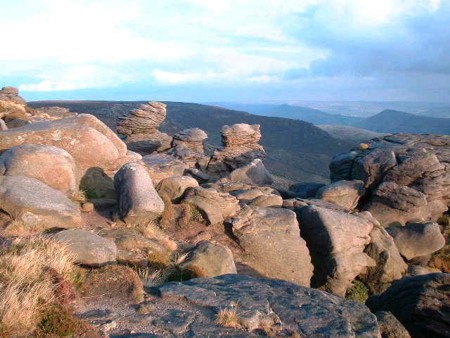
Photograph courtesy of ANDY WALLACE
ML![]() But are you able to build some bridges, to establish links with Israeli dissidents?
But are you able to build some bridges, to establish links with Israeli dissidents?
RS![]() During the first Intifada, there was a policy by progressive Palestinians and Israelis to establish as many
links as possible between the two sides and to see the struggle as a common struggle for the future of both sides. This was extremely important
and was working very well. Israelis were learning quite a lot about what was happening in the Palestinian areas. The Israeli media covered
events quite extensively. When the Israeli army had done something terrible, the Israeli public would be shocked and react by going on demonstrations
to express their sense of horror at the atrocity that was committed. Then came the Oslo Accords and because of their complication and the
false promise they gave, they made many people think "the problem has now been solved, I can get on with my life". And then of course there
were changes in the world and the conservatism that has arisen not only in Israel and Palestine but also amongst the young generally which
manifested itself in the young wanting to manage their lives, and ensure that they can survive professionally. We had a generation which
missed activism. Then we come to the new situation, which is the present, where Israelis are prohibited from visiting. However, a new
generation of Israelis have come up, they are not many in number, but they are significant, who refuse to believe what is told to them.
One such group is called Ta'ayush, which means "living together", which is an amazing group of Palestinians and Israelis who have their
own mind about things and who see things very clearly and do not want to be very visible, who work on what they believe is important.
For example there are Israelis who accompany school children in order to enable these children to get to their school because they are
attacked by the settlers in the Hebron area. They are vilified, they are arrested by the army and the soldiers, but they consistently
and continuously go on doing it. Then there is Bil'in where the wall is being built. Week after week protestors go there to try and prevent or
slow down the building of the wall. Week after week, tear gas bombs are thrown, protestors are shot and injured, in some cases also killed but
they don't stop. They continue. The High Court has ruled that the course of the wall has to be changed . The army doesn't always accept the
court's ruling. And so the protests persist. This is very important. Political activism as practiced has changed - it has become much more
complicated for an individual on the Palestinian or Israeli side to influence the course of the politics of the government. However, there
is hope that with persistent action they will succeed.
During the first Intifada, there was a policy by progressive Palestinians and Israelis to establish as many
links as possible between the two sides and to see the struggle as a common struggle for the future of both sides. This was extremely important
and was working very well. Israelis were learning quite a lot about what was happening in the Palestinian areas. The Israeli media covered
events quite extensively. When the Israeli army had done something terrible, the Israeli public would be shocked and react by going on demonstrations
to express their sense of horror at the atrocity that was committed. Then came the Oslo Accords and because of their complication and the
false promise they gave, they made many people think "the problem has now been solved, I can get on with my life". And then of course there
were changes in the world and the conservatism that has arisen not only in Israel and Palestine but also amongst the young generally which
manifested itself in the young wanting to manage their lives, and ensure that they can survive professionally. We had a generation which
missed activism. Then we come to the new situation, which is the present, where Israelis are prohibited from visiting. However, a new
generation of Israelis have come up, they are not many in number, but they are significant, who refuse to believe what is told to them.
One such group is called Ta'ayush, which means "living together", which is an amazing group of Palestinians and Israelis who have their
own mind about things and who see things very clearly and do not want to be very visible, who work on what they believe is important.
For example there are Israelis who accompany school children in order to enable these children to get to their school because they are
attacked by the settlers in the Hebron area. They are vilified, they are arrested by the army and the soldiers, but they consistently
and continuously go on doing it. Then there is Bil'in where the wall is being built. Week after week protestors go there to try and prevent or
slow down the building of the wall. Week after week, tear gas bombs are thrown, protestors are shot and injured, in some cases also killed but
they don't stop. They continue. The High Court has ruled that the course of the wall has to be changed . The army doesn't always accept the
court's ruling. And so the protests persist. This is very important. Political activism as practiced has changed - it has become much more
complicated for an individual on the Palestinian or Israeli side to influence the course of the politics of the government. However, there
is hope that with persistent action they will succeed.
ML![]() I think politics is very different now to the politics you and I grew up with. There was a belief
in the political process and in mass movements. I think things have become much more individualised now. Young people in particular often
search for identity, to discover who they are. But sadly their identity often becomes defined by their religion or race rather than by
who they are as human beings. One thing I enjoyed so much about our walk near Ramallah was the wonderful group of people, not all young,
from England, America, Italy and Ramallah itself. And we weren't talking about politics as we walked, we were talking about plants, the
wildlife and the nature and we just enjoyed getting to know each other, out there in the fresh dawn air, in this wonderful and ancient
landscape. It was such a pleasure.
I think politics is very different now to the politics you and I grew up with. There was a belief
in the political process and in mass movements. I think things have become much more individualised now. Young people in particular often
search for identity, to discover who they are. But sadly their identity often becomes defined by their religion or race rather than by
who they are as human beings. One thing I enjoyed so much about our walk near Ramallah was the wonderful group of people, not all young,
from England, America, Italy and Ramallah itself. And we weren't talking about politics as we walked, we were talking about plants, the
wildlife and the nature and we just enjoyed getting to know each other, out there in the fresh dawn air, in this wonderful and ancient
landscape. It was such a pleasure.
But I could see as we walked in the Peaks how you marvelled at the ancient Edale Cross and at the Woolpacks, which are huge square limestone boulders poking out of the ground like a giant's broken teeth.
RS![]() Our walk reminded me of how I used to feel about the hills near Ramallah up to the late seventies, when
there was absolutely no settlement around Ramallah. There were ancient paths connecting all the villages to each other. These were our protected
public paths. I used to follow these in the walks I took. It felt so good to be following the footpaths of my ancestors as they visited these hills.
I never got lost. Now after many of them have been destroyed by the settlements, I often look in vain for a track to follow. You can still see these
passages in the nineteenth century maps the British prepared of the country. Most of the tracks we now use have been created by the goats and
sheep as they are taken by the shepherd to graze. Because the old tracks have gone and the markers I used to follow are also gone I have had
the terrible experience of getting lost in the areas that are familiar to me.
Our walk reminded me of how I used to feel about the hills near Ramallah up to the late seventies, when
there was absolutely no settlement around Ramallah. There were ancient paths connecting all the villages to each other. These were our protected
public paths. I used to follow these in the walks I took. It felt so good to be following the footpaths of my ancestors as they visited these hills.
I never got lost. Now after many of them have been destroyed by the settlements, I often look in vain for a track to follow. You can still see these
passages in the nineteenth century maps the British prepared of the country. Most of the tracks we now use have been created by the goats and
sheep as they are taken by the shepherd to graze. Because the old tracks have gone and the markers I used to follow are also gone I have had
the terrible experience of getting lost in the areas that are familiar to me.
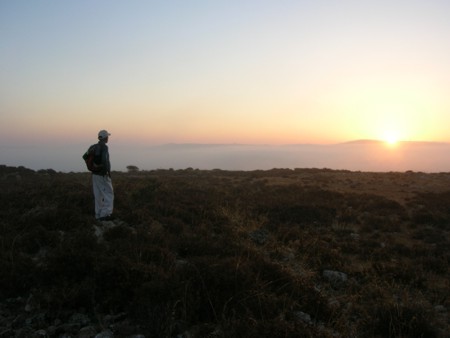
The first walk - Raja Shehadeh watching the sunrise at Dura Kara'a
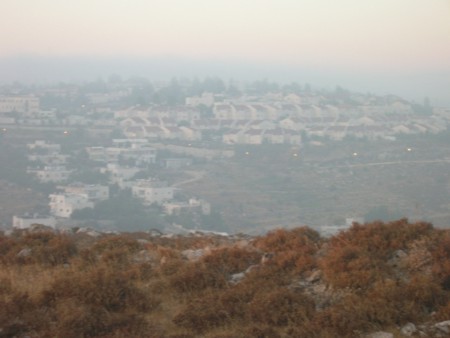
As dawn breaks, the settlement on the facing hillside comes into view.
RS (continued)![]() The last time I felt the freedom I felt today in the Peak District was in the late seventies
when there were no settlements around Ramallah. I remember once meeting an old farmer on one of my walks and we started talking. Suddenly, out
of the blue, (and farmers can be quite blunt), he gave me a piece of advice He said "You have to marry a big woman. So your children will be of
a good size". He had been impressed by how small I was. He was literally sizing me up and being concerned about my progeny . As it happened
I didn't follow his advice and married Penny, who isn't a big woman. Maybe my small size is very well suited for walking in our hills. My
legs are short and my ankles strong from doing so much walking in our stony land. I've never had any problems and I don't wear boots. I
just wear walking shoes and I feel like a goat when I am walking.
The last time I felt the freedom I felt today in the Peak District was in the late seventies
when there were no settlements around Ramallah. I remember once meeting an old farmer on one of my walks and we started talking. Suddenly, out
of the blue, (and farmers can be quite blunt), he gave me a piece of advice He said "You have to marry a big woman. So your children will be of
a good size". He had been impressed by how small I was. He was literally sizing me up and being concerned about my progeny . As it happened
I didn't follow his advice and married Penny, who isn't a big woman. Maybe my small size is very well suited for walking in our hills. My
legs are short and my ankles strong from doing so much walking in our stony land. I've never had any problems and I don't wear boots. I
just wear walking shoes and I feel like a goat when I am walking.
ML![]() You look like a goat!
You look like a goat!
RS![]() Thank you.
Thank you.
ML![]() In the nicest possible way!
In the nicest possible way!
The descent from Brideswood Clough down into Edale
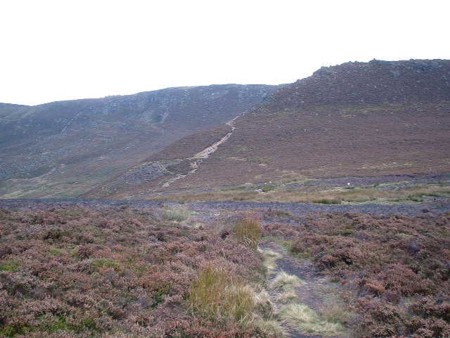
Photograph courtesy of ANDY WALLACE
RS![]() We also have our common love of the land. It is perhaps the case that young people are realising that their
survival might not be guaranteed if they simply do well in the existing world order because the system is bringing disaster to the ecology. In
the case of Palestine and Israel, there is such shortage of water, that might bring more and more people to realise that simply following
the path of their government and the policies of the government, such as attempting to bring millions of Jews into a small country like Israel
will bring disaster to all of us. The resources of the country cannot sustain them.
We also have our common love of the land. It is perhaps the case that young people are realising that their
survival might not be guaranteed if they simply do well in the existing world order because the system is bringing disaster to the ecology. In
the case of Palestine and Israel, there is such shortage of water, that might bring more and more people to realise that simply following
the path of their government and the policies of the government, such as attempting to bring millions of Jews into a small country like Israel
will bring disaster to all of us. The resources of the country cannot sustain them.
ML![]() Let's talk about the water. As we were walking along Crowden Edge, through the Woolpacks at the point at
which we crossed Brideswood Clough we started talking about whether a clough is the same as the wadis you describe in your book. We agreed a
wadi is more like a dale. On the walk I did with you at Dura Kara'a, we came across a wonderful limestone spring bubbling out between the rocks,
in a landscape that looked desperately parched. The water had been so carefully channelled, with courses cut into the rock and a concrete holding
tank and lots of plastic bottles - which weren't so pretty, but obviously people had been using them to gather water. It had been channelled
from the tanks down to the fields of marrows and pumpkins where we met a lovely couple who'd come out there in the early morning to tend their
plants. It made me realise how in that very dry landscape every drop of water that gushed out of the ground has to be used.
Let's talk about the water. As we were walking along Crowden Edge, through the Woolpacks at the point at
which we crossed Brideswood Clough we started talking about whether a clough is the same as the wadis you describe in your book. We agreed a
wadi is more like a dale. On the walk I did with you at Dura Kara'a, we came across a wonderful limestone spring bubbling out between the rocks,
in a landscape that looked desperately parched. The water had been so carefully channelled, with courses cut into the rock and a concrete holding
tank and lots of plastic bottles - which weren't so pretty, but obviously people had been using them to gather water. It had been channelled
from the tanks down to the fields of marrows and pumpkins where we met a lovely couple who'd come out there in the early morning to tend their
plants. It made me realise how in that very dry landscape every drop of water that gushed out of the ground has to be used.
RS![]() When I started hill walking in the seventies, there were many more springs that were active. I have
noticed that there is much less water than there used to be. Part of the reason is that the springs are not being cared for and cleaned.
Another reason is the excessive drawing of water from the underground reservoirs. There is also a problem in Israel related to the manner
Israel uses its water. In the settlements you find large areas of land with lawns when grass is totally not indigenous to that dry area of
the world. To keep it green you need large amounts of water. Then in their choice of decorative plants to decorate the entrances of their
settlements they seem to favour annuals that need a lot of water to grow, such as petunias. They could for example plant geraniums, which
are beautiful and have a long flowering season and are drought resistant. Then there is another problem related to the strength of the
farmers' union in Israel. This means that farmers consume a lot of water which they get at subsidized rates. They choose water- retaining
fruits such as oranges and end up exporting water to Europe which has all the water it needs and more. There are a number of certain things
Israel could do about the water problems, such as desalination and recycling, but they seem hesitant to do it. I am told that the reason is
political. This is because the government, which wants to hold on to the occupied territories, can then argue that as long as the water
problem is not resolved, how can we possibly give away the Occupied Territories where some of the underground water aquifers are located.
Of course, there are international laws that regulate the sharing of aquifers that could be relied upon if Israel was serious about peace
with the Palestinians.
When I started hill walking in the seventies, there were many more springs that were active. I have
noticed that there is much less water than there used to be. Part of the reason is that the springs are not being cared for and cleaned.
Another reason is the excessive drawing of water from the underground reservoirs. There is also a problem in Israel related to the manner
Israel uses its water. In the settlements you find large areas of land with lawns when grass is totally not indigenous to that dry area of
the world. To keep it green you need large amounts of water. Then in their choice of decorative plants to decorate the entrances of their
settlements they seem to favour annuals that need a lot of water to grow, such as petunias. They could for example plant geraniums, which
are beautiful and have a long flowering season and are drought resistant. Then there is another problem related to the strength of the
farmers' union in Israel. This means that farmers consume a lot of water which they get at subsidized rates. They choose water- retaining
fruits such as oranges and end up exporting water to Europe which has all the water it needs and more. There are a number of certain things
Israel could do about the water problems, such as desalination and recycling, but they seem hesitant to do it. I am told that the reason is
political. This is because the government, which wants to hold on to the occupied territories, can then argue that as long as the water
problem is not resolved, how can we possibly give away the Occupied Territories where some of the underground water aquifers are located.
Of course, there are international laws that regulate the sharing of aquifers that could be relied upon if Israel was serious about peace
with the Palestinians.
ML![]() Are there? I didn't realise.
Are there? I didn't realise.
RS![]() Yes, for over ground and underground, there is a way of how to share the water, just as you share
the land. The other disaster is the Jordan River which is almost non-existent now - hardly a creek. The Dead Sea is also dwindling. It is
now in two parts and between these two parts there is empty land. The whole region is being destroyed for all of us people living in the
land. Maybe in the face of ecological disaster, people and young people in particular will realise that it is not enough for them to fight
within the system, they have to fight the system and find a new way to co-exist. That might bring some hope.
Yes, for over ground and underground, there is a way of how to share the water, just as you share
the land. The other disaster is the Jordan River which is almost non-existent now - hardly a creek. The Dead Sea is also dwindling. It is
now in two parts and between these two parts there is empty land. The whole region is being destroyed for all of us people living in the
land. Maybe in the face of ecological disaster, people and young people in particular will realise that it is not enough for them to fight
within the system, they have to fight the system and find a new way to co-exist. That might bring some hope.
ML![]() In writing my book, I tried very hard to come up with grounds for hope, but it hasn't been easy.
In writing my book, I tried very hard to come up with grounds for hope, but it hasn't been easy.
RS![]() I want to tell you very sincerely that I believe what you have done is at the heart of what needs to be
done. In order for Israel to succeed in doing what it is doing, it needs concealment. It needs the Palestinian voice to be silenced. It needs
to have only one voice which is its own voice explaining why it needs to be doing these odious crimes against the Palestinians and how vital
they are for Israel's survival. This is of course rubbish. But this fact might not be readily understood by people outside who are observing
it all. So when people like you who are not biased because you are neither from this side nor from that, who are sensible, and who have a
sense of justice come and visit without preconditions or preconceptions. And you just describe what you see. Then you're doing
something very important.
I want to tell you very sincerely that I believe what you have done is at the heart of what needs to be
done. In order for Israel to succeed in doing what it is doing, it needs concealment. It needs the Palestinian voice to be silenced. It needs
to have only one voice which is its own voice explaining why it needs to be doing these odious crimes against the Palestinians and how vital
they are for Israel's survival. This is of course rubbish. But this fact might not be readily understood by people outside who are observing
it all. So when people like you who are not biased because you are neither from this side nor from that, who are sensible, and who have a
sense of justice come and visit without preconditions or preconceptions. And you just describe what you see. Then you're doing
something very important.
ML![]() I have a terrible feeling that my book will end up either disappointing everybody or making everybody
very angry. I have Jewish and Palestinian characters, through whose experiences we learn something about the history of the region, and who
end up being able to engage with each other at the level of the story, but I haven't been able to come to any wider conclusions or to say
this is right way forward to resolve the conflict in the Middle East. All I have done is given the characters voices, and I am sorry to say
that, because of the sort of writer I am, they are comic voices, so maybe people will be offended even by that.
I have a terrible feeling that my book will end up either disappointing everybody or making everybody
very angry. I have Jewish and Palestinian characters, through whose experiences we learn something about the history of the region, and who
end up being able to engage with each other at the level of the story, but I haven't been able to come to any wider conclusions or to say
this is right way forward to resolve the conflict in the Middle East. All I have done is given the characters voices, and I am sorry to say
that, because of the sort of writer I am, they are comic voices, so maybe people will be offended even by that.
RS![]() All the better to have comic voices, a little bit of comic relief is needed in that situation.
And the best way for people sometimes to understand the situation is to laugh about it.
All the better to have comic voices, a little bit of comic relief is needed in that situation.
And the best way for people sometimes to understand the situation is to laugh about it.
ML![]() I think we can agree about that.
I think we can agree about that.
![]()
Peak District photographs courtesy of ANDY WALLACE at andyfellwalker.com
![]()

